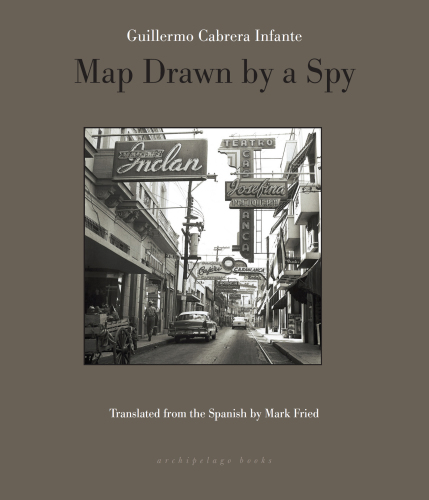
Map Drawn by a Spy
کتاب های مرتبط
- اطلاعات
- نقد و بررسی
- دیدگاه کاربران
نقد و بررسی

June 26, 2017
Fidel Castro’s Cuba is a barren and perilous isle in Cabrera Infante’s melancholy memoir. In 1965 Cabrera Infante was 36, living in Belgium with his wife, and serving as the Cuban embassy’s cultural attaché. Brought home by his mother’s sudden death, Cabrera finds his beloved Havana deeply altered under the new Communist government: businesses shuttered, medicine scarce, food strictly rationed, and political attitudes so arbitrarily changeable that even supporters of the revolution are jailed. As diplomatic intrigue imperils his return to Europe, Cabrera Infante visits with old friends and family. He wanders through a city in which “everyone is seemingly overwhelmed by a profound sadness,” and embarks on trysts with old girlfriends and new acquaintances. Completed in the 1960s, soon after Cabrera Infante’s last Cuban interlude, this memoir is an engaging sketch of a midcentury man of letters, with all his attendant prejudices and predilections—an admirer of Nabokov and Cortázar who drinks and womanizes with pleasure, judges harshly, and falls in love despite himself. It’s also the piercing lament of an exile, who sees his world disappearing even before he departs it: “He was in his own country, but somehow his country was not his country; an imperceptible mutation had changed people and things into their mirror image; everyone and everything was there, but they weren’t themselves.”

June 15, 2017
A geography of disillusionment as limned by the noted Cuban writer (Guilty of Dancing the Chachacha, 2001, etc.), once a stalwart of the Fidelista revolution.The men and women who trudged out of the mountains and into Havana 60-odd years ago were a tough, committed lot. Their civilian successors were just as tough; even when behind the compound walls, writes Cabrera Infante, Cuba's ambassador to Belgium carried a heavy pistol, while his first secretary "had already killed an exiled Cuban in Santo Domingo." Stationed in Brussels as a cultural attache in the mid-1960s, Cabrera Infante traveled to Barcelona to collect a literary award, his movements chronicled at the order of a one-time aristocrat who, now a Fidelista, "did no work at the embassy, who never worked at all, since he had no skills or knowledge of anything." It was a silly inquiry, since, Cabrera Infante writes, the lives of every junior officer in the embassy were transparent, and all were true believers in the cause of Cuban communism. As time wore on, Cabrera Infante's commitment to that cause withered, for one thing because a certain moralizing conservatism crept in, such that homosexuals were persecuted and an editor friend of his was removed from his post for having invited Allen Ginsberg to Cuba, who then "scandalized the leaders of the Revolution by crowing in public that he wanted to go to bed with Che Guevara!" When he returned to Cuba and found that children could no longer have cake at their birthday parties and that domestic scotch tasted "like disinfectant," the bloom was most definitely off the red rose. Cabrera Infante's tone is quiet and melancholic, especially when, comparing notes with other writers such as Alejo Carpentier, he reaches a profound conclusion: "Just because the Revolution took writers in (and over) did not mean that literature wasn't a dangerous frivolity." An exile's plainspoken testimonial, bookending Orwell's Homage to Catalonia in the literature of political disappointment.
COPYRIGHT(2017) Kirkus Reviews, ALL RIGHTS RESERVED.

September 1, 2017
Distinguished Cuban author Cabrera Infante (Three Trapped Tigers) initially supported the revolution but eventually went into exile. This account of his final months in Cuba, found among his possessions after his death, could be called autobiographical fiction or fictionalized autobiography but either way is insightful and engrossing. Informed that his mother is gravely ill, the protagonist rushes home from the Cuban Embassy in Brussels to a pale, reduced Havana. Food and even water for bathing are scarce, and doctors are barely available. More tellingly, homosexuals face persecution, art and literature are being suppressed, and getting his new book published in Cuba seems unlikely; a magazine won't even print an interview, "perhaps due to views that curiously overlapped with those of the intelligence service." Castro has emerged as just another Latin American strongman, as loudspeakers bray revolutionary slogans. With his brother, who had been in Spain, our hero finds that he's blocked from leaving and starts planning a way out, meanwhile plunging into the everyday affairs of family and friends and indulging in sexual liaisons, all precisely detailed in a narrative driven by dialog. VERDICT Never didactic, this slice-of-life portrait of Cuba at a crucial moment will find readers beyond Latin American enthusiasts.
Copyright 2017 Library Journal, LLC Used with permission.

























دیدگاه کاربران